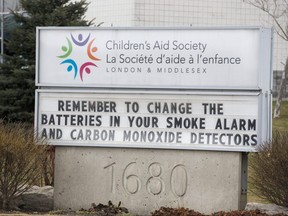Article content
The London-area child welfare agency is cutting jobs and overhauling some services in the face of a “significant” budget shortfall that its union blames on inadequate provincial funding.
Nineteen unionized and four management jobs are affected by the shake-up, said the Children’s Aid Society of London and Middlesex. Its executive director said spending cuts alone, however, won’t whip the agency’s projected $9.1-million deficit this year.
Article content
“We cannot eliminate the deficit through expenditure cuts alone,” Chris Tremeer said in a statement Wednesday night, adding the agency will keep working with provincial ministries “to identify (child) placement solutions and adequate funding for the most complex children and youth that we are serving.”
The layoffs and programming fallout at the children’s aid society (CAS) will have “a dramatic impact” on the children and young people the agency serves, warned Bruce Fleming, a youth worker and president of the Ontario Public Service Employees Union, Local 116, which represents staff.
“The workers are feeling terrible. The morale is very low,” he said. “There will be fewer people to assist overall.”
Fleming blamed Doug Ford’s Progressive Conservative government for the layoffs he said were “propelled by systemic underfunding.”
The laid-off employees worked in kinship support – that’s when a relative or someone else close to a child takes responsibility for them, usually because their parents are unable to – and in family visiting and family support, the union said.
Article content
The union also warns the closing of a family visiting program and elimination of in-home support positions will have a spill-over effect on other social service and community agencies, putting more strain on them in what it calls a “crisis” in the child welfare system in Ontario, including the London area.
The agency, one of dozens in Ontario, is funded by the province to protect and provide services, including substitute care, to vulnerable children.
Critics, including public-sector unions, have decried the growing pressures on Ontario’s child welfare agencies, hit by rising costs and resources so strained that some children in care in the province have been placed in hotels and motels. Some of the agencies, including in Southwestern Ontario, have also had to deal with children surrendered to them by parents unable to access needed mental health support to care for their kids on their own.
The province maintains that is has increased funding for child protection services in Ontario.
More than two-thirds of its projected deficit this year, $6.5 million, will come from caring for young people with “complex needs that are not able to be supported by the children’s mental health or licensed group care settings in Ontario,” the London-area CAS said.
Article content
The other $2.6 million in the shortfall is driven by rising costs — of residential care, the repeal of the province’s wage-cap law and what the agency called “service models that have not evolved” to meet families’ needs.
The agency, which has about 400 employees, said it reviewed all its programs and positions to find savings while protecting essential services. No changes will be made to its child protection staffing levels, but its family visiting program and family support positions “will be concluded in their current format,” with services redesigned.
Visits for families with children in the agency’s care will not be affected during the transition, the CAS said, adding families will receive information about the changes to the program in mid-July. Changes are also being made in kinship support, with those plans to be shared with families before the summer ends.
All told, the agency said its overhaul will save a projected $2.1 million a year.
Redesigning its programming will allow the CAS to provide essential services “in ways that are aligned with current service volumes and provincial practices,” Marg Parks, who chairs the agency’s board, said in Wednesday’s statement.
Fleming predicted the fallout for families in need will only get worse. “A lot of families will fall through the cracks more,” he said.
The number of foster homes and parents has also dropped in recent years, he said, attributing that to the provincial funding shortfall.
“We’ve struggled for a few years, even before COVID, to provide adequate, safe and secure placements for children and youth.”
bbaleeiro@postmedia.com
Share this article in your social network



)






